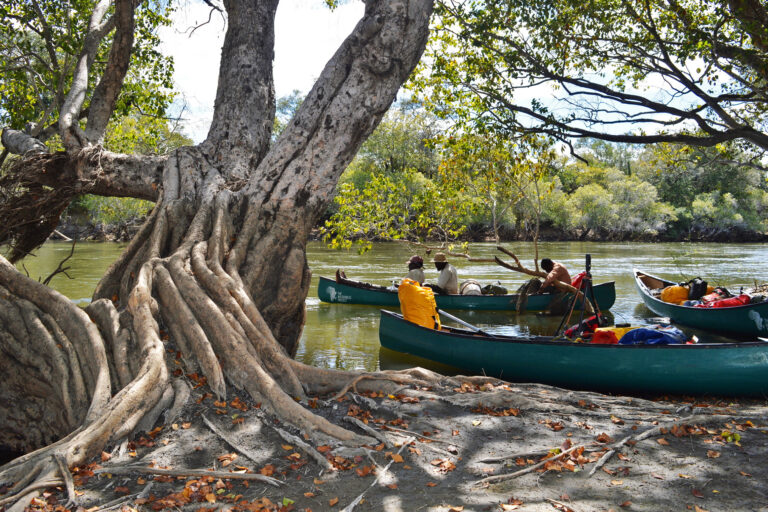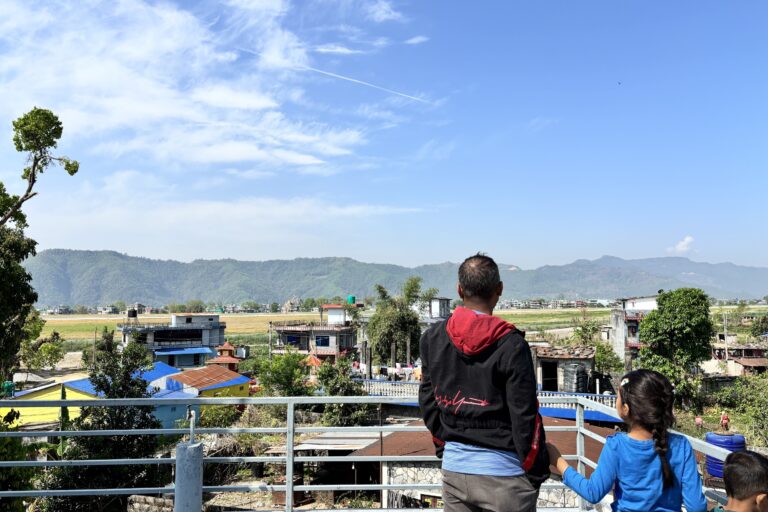- San Miguel Corporation, one of the Philippines’ largest conglomerates, has started mining coal from a concession in the mountain village of Ned in the country’s south.
- The local Catholic diocese, along with environmental and tribal groups, oppose the mine, citing potential risks to the environment and to the region’s water and food supply.
- Since mining began, complaints have centered on noise and traffic accidents caused by trucks hauling coal along the mountain roads, and on conditions at the relocation site where some families have already moved after selling their land and homes to the company.
- Opponents of the mine also accuse the miner of violating a provincial ban on open-pit mining, though the company claims it’s employing strip mining to extract the coal.
SOUTH COTABATO, Philippines — On a sunny Wednesday in August, police officer Loreto Malon and a subordinate were riding their motorcycles in the mountain mining village of Ned on their way to the lowlands when a speeding haul truck loaded with coal nearly hit and killed them.
“We could have been crushed if we did not swerve to the shoulder of the road to avoid the hauler truck,” Malon said, mouthing expletives.
For more than a year, 10- and 12-wheel heavy haul trucks with payloads up to 35 metric tons have become a regular fixture in the once sleepy village of Ned.
In the first quarter of 2022, the San Miguel Corporation, one of the largest and most diversified conglomerates in the Philippines, began preparatory work for a coal mine in the village. This was despite opposition from the local Catholic Church as well as environmental and tribal groups, who cited concerns about risks to the environment and to lowland farms that rely on the upland watersheds for irrigation.
Since work began, complaints against the venture have started to ring out loud in the village, particularly about the noise from the heavy trucks going at all hours.

With a population of 18,500 and a land area of 41,247 hectares (101,924 acres), coal-rich Ned is the largest of the 19 villages of Lake Sebu township in South Cotabato province on the island of Mindanao, about 1,500 kilometers (930 miles) south of Manila.
Since visible mining production started in January 2023, at least 100 of these large haul trucks traverse the village road daily up to the nearby coastal township of Maitum, a distance of about 50 km (30 mi). There, the coal is loaded in barges and reportedly shipped to San Miguel’s affiliated coal-fired power plants, one of which is in Mindanao’s Davao region.
San Miguel operates the mine through one of its many subsidiaries, San Miguel Global Power Holdings Corp. (San Miguel Global), which also operates some of the biggest coal, gas and hydropower plants in the country.
The conglomerate bought the coal mines in Ned and surrounding areas in early 2010, taking over contracts previously awarded to three other companies: Bonanza Energy Resources Inc., which had rights over 8,000 hectares (nearly 20,000 acres); Daguma Agro Minerals with 2,000 hectares (5,000 acres), and Sultan Energy Philippines Corp. with 7,000 hectares (17,000 acres).
Although the concessions straddle the townships of Lake Sebu, Maitum and Bagumbayan, coal extraction activities to date have occurred only in Lake Sebu’s Ned village, where the scar left by the mining operation can be seen from a distance.

Alan Alam, the Ned village chief, said the mining operation has so far torn up an estimated 100 hectares (250 acres) of once rolling fields of trees, corn and vegetables.
“They are already into production but not yet in full-blast operation,” Alam told Mongabay.
San Miguel Global has sought the village government’s consent for round-the-clock mining operations — a proposal Alam said they’re still studying due the high volume of public complaints.
Since November 2023, local police have received reports of at least 49 traffic accidents linked to road damage caused by the heavy-loaded trucks, said Malon, the police sergeant. Alam said San Miguel Global has repaired damaged sections of the road by pouring gravel, but added they keep being torn up again by the truck traffic because there’s no other way for the coal to get to port.
“The solution to this problem is for the company to build its own road network,” Malon said.
The village government is considering imposing a truck ban from 10 p.m. to 4 a.m. in response to complaints about noise, Alam added.
Other complaints center on the relocation site provided to the 233 families already displaced by the project, which is farther from the road than their previous homes, and lacks facilities such as schools, a health center, water and electricity.

In December 2021, during the deliberation over the project’s endorsement by the South Cotabato provincial government, San Miguel’s chairman and chief executive officer, Ramon S. Ang, said the tribal and non-tribal villagers displaced by the coal mining operation would be provided with land and a house in a relocation site.
Villagers said the company paid compensation starting at 80,000 pesos per hectare of farmland ($1,430 per hectare, or $580 per acre), while it valued smaller lots with houses at 50,000 pesos ($890) plus the value of the house. For example, one owner said their family was paid 300,000 pesos (about $5,400) for their land and house.
But a resident who asked to be identified only as Toto, citing safety reasons, said relocated residents are expected to pay for building the new homes, using the compensation received from their old property.
Villagers said the mining operation has also created hundreds of jobs, providing business opportunities to residents who rented out rooms or set up sari-sari (mom-and-pop stores) or eateries, among other small businesses.
Prior to the production phase, the mining company spent at least 80 million pesos ($1.4 million) as part of its social development and management program. The funds were used for projects such as scholarships, road repairs, day-care centers and a gym, village chief Alam said.
Now that San Miguel Global has progressed into the production stage, he said, “there’s no update how much annual development fund the village would receive from the company.”

Meanwhile, the Catholic Diocese of Marbel, which covers the village of Ned, has accused the mining firm of harassment and intimidation, citing the arrest and detention in April of four members of a family who refused to sell their farmland to the company. Cases of trespassing were filed against the family for allegedly entering company premises. One member of the family was also charged with making “grave threats” because he had a knife in his possession. These cases were later dismissed by prosecutors.
The village government and the company have held several talks to discuss the complaints or issues brought against the mining venture, which the latter promised to address.
San Miguel didn’t respond to questions from Mongabay to its published media contacts.
During its presentation to the South Cotabato provincial government in 2021, San Miguel said it planned to extract an estimated 180 million metric tons of coal from its concession in Ned and the surrounding areas. According to the Philippine Department of Energy, the area could potentially hold 230.4 million metric tons.
Company representatives also told provincial officials that the company would rely on strip mining to extract the deposits, as the province has since 2010 banned open-pit mining.
“Coal cannot be mined using open-pit mining method because such mineral is soft,” Ang said at the time. “You can’t operate from the top because it will collapse. You can only operate from the side, you strip it … Our coal mining operation will not be an open-pit operation.”
Many industrial-scale coal-mining operations around the world employ open-pit (or open-cast) mining, including the world’s biggest, the KPC-Bumi Resources site in Indonesian Borneo.

Ang also said the company plans to mine on 100 hectares of its concession in the first five years of extraction.
Bishop Cerilo Casicas of the Diocese of Marbel, which continues to vehemently oppose the coal mine project, disputed Ang’s claim.
“How can that be strip mining when the company dug a pit?” he said. “Anywhere you look at it, that’s open-pit mining which is a violation of the provincial ordinance.”
Village chief Alam agreed that the mining being carried out by the company is open-pit mining.
However, the provincial government has so far not intervened in the project, which straddles the Kabulnan River Watershed and Forest Reserve and the Allah Valley Watershed Forest Reservation. Observers have warned that any damage to these watersheds, which supply water to downstream rivers that feed lowland farms, could endanger water and food security for millions of people in Mindanao.
In the nearby coastal town of Maitum, where the coal is transferred from trucks to ships, a group called the Maitum Advocates for Sustainable Environment (MASE) has also called for an end to the mining project.
Maitum sits downhill from the mine site, and the group says disasters like flooding could strike the town as a result of the mining activities in the mountains of Ned. They’ve also expressed concern about the risks to watersheds and forestland, as well as the noise and dust from the trucks passing through the town.

The mining activity has also come close to, but not encroached on, the titled ancestral domain of the Indigenous T’boli-Manobo S’daf Claimants Organization (TAMASCO), which spans 1,682 hectares (4,156 acres). Members of the community say they remain vigilant; TAMASCO has opposed the coal-mining project since exploration began in the early 2000s.
“The way things are turning now, the mining activities are going towards our ancestral domain,” TAMASCO president Datu Dande Danyan told Mongabay in August. “I will not allow them to encroach on our ancestral lands even if it will cost me my life.”
In December 2017, Dande Danyan’s cousin, Datu Victor Danyan, then the TAMASCO chair and at the forefront of the struggle to defend their ancestral lands, and six other tribal members were killed during a military operation. The community denounced it as a massacre, but the military insisted they were communist supporters and were killed in a legitimate encounter. Human rights groups have long criticized the Philippine security forces for the practice of “red-tagging”: alleging, often groundlessly, that a person is a communist or a communist sympathizer, in order to justify killing them.

As a group, Dande Danyan said his people wanted their lands in their own hands. If they sold out to the mining company, he said, the money would vanish quickly. He pointed out that many of the families who sold their farms years ago now live in poverty, working as laborers or farmhands.
“Whereas if you own the land and you are industrious and content in simple living, you can earn enough from farming,” he said, added that corn and vegetables such as carrot, squash, cabbage and tomato, among others, thrive in the area.
When the South Cotabato legislature gave its support to San Miguel’s coal-mining project three years ago, they specifically excluded the TAMASCO area and all other formally recognized watersheds from their endorsement, “unless all necessary documents are complied with.”
Dande Danyan noted that all activities by outsiders within their titled ancestral domain must have the consent of the tribal association. He said the mining company has been wooing him to get his support, but that he responded by telling them to do everything by the book. In particular, this includes undertaking a process to obtain the free, prior and informed consent (FPIC) from the Indigenous people for any activity that would affect their rights to land and territory.
“Our ancestral domain is a collective property,” Dande Danyan said. “We will decide as a group where the voice of the majority shall prevail.”
Southern Philippine coal project moves ahead despite community opposition
FEEDBACK: Use this form to send a message to the author of this post. If you want to post a public comment, you can do that at the bottom of the page.














